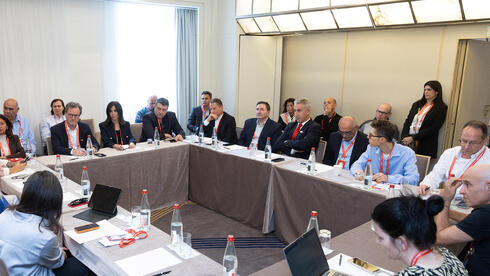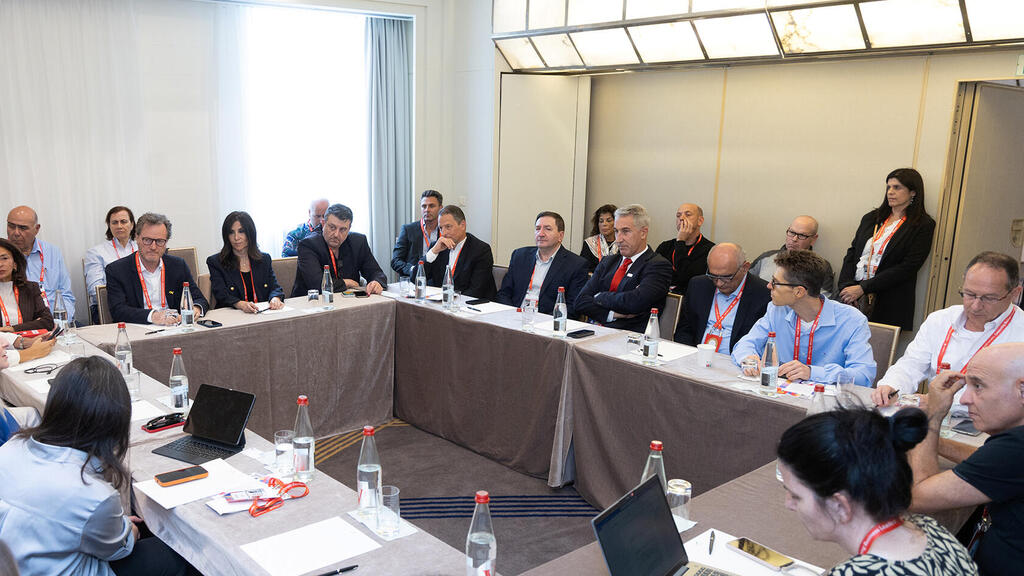
Paris 2024
Poalim Tech CEO: "Mature Israeli high-tech companies are also expanding into European markets"
At a round table on investments and cooperation with Europe, held as part of the business delegation to Paris organized by Calcalist and Bank Hapoalim, Michal Kissos Hertzog added, "Although Europe is a complex market made up of several countries with different cultures and regulations, it is a very strong market that should be considered in the advanced stages of growth."
Is the European market an opportunity to expand operations or recruit investors, and what is the right way to navigate it? These questions were discussed by members of the round table during the business delegation to Paris organized by Calcalist and Bank Hapoalim. The discussion was moderated by Michal Kissos Hertzog, CEO of Poalim Tech, who pointed out that Europe has not been the focus of most high-tech companies, despite the potential that exists in the continent.
"American companies and funds are active in the technology market in Israel, with financial investments three times greater than those from Europe. This reflects the strong ties between the two countries and the preferences of entrepreneurs," said Kissos Hertzog. "This trend continues, but we see that mature tech companies are also expanding into European markets. Although it is a more complex market made up of several countries, cultures, and different regulations, it is a very strong market that should be considered in the advanced stages of a company's growth, when there is no longer a risk of losing focus, but rather a chance to grow."
Representatives from the Israeli business sector who are active in Europe shared their experiences during the discussion. David Fattal, the controlling owner of the Fattal Hotel Company, said that the company started operating in Europe in 2005, and today, out of the group's 300 hotels, 80% are in Europe. "We started in Germany in 2005, choosing a country with a culture more similar to Israel's, unlike the trend of going to Romania, Ukraine, etc. We focused on Western Europe, where the business environment is similar to Israel. Additionally, Europe's pro-business culture makes it easier to grow in the hotel industry there than in Israel."
Sivan Shamri Dahan of Qumra Capital recounted that when the fund was established a decade ago, it first tried to raise funds in the American market: "The fundraising failed because we had not yet accumulated a track record. Then we were introduced to French banks and families. We met investors who thought outside the box and decided to invest in us despite our lack of a track record. Today, half of our investors are from the U.S., having joined after we established a record, but we greatly value our relationship with French investors who not only invest but also help our companies expand their activities in Europe."
Paul Besnainou, founder and CEO of the Israeli startup Sweet Inn, which operates in the tourism sector, highlighted the ease of travel between European countries, often by train, allowing the company to build an entire team in Europe.
Dori Manor, chairman of the Lubinski Group, which is active in the automobile market, noted that even in the traditional automobile industry, there is no consolidation, and there are differences in activity between countries.
Sarah Rolland from the software company Appsflyer added that localization is crucial when operating in Europe, and it is important to build partnerships and establish local offices in different countries.
French and Israeli investors also discussed changes in the European market. Yuval Cohen from the venture capital fund StageOne observed a significant change in the French market over the last decade: "There are more serial entrepreneurs and high-tech companies founded in France that have become large enterprises. This mirrors the process Israel went through in 2005, presenting interesting opportunities for Israeli funds in Europe and France."
Another key issue discussed was how the ongoing war affects the desire in Europe to invest in or do business with Israeli companies. Amiel Azoulai noted that interest in investing in Israeli tech exists, but there are concerns about Israel being perceived as unstable. She emphasized that when presenting the fund's investments, they highlight that these are global companies and that Israel is one of the largest high-tech centers in the world. Despite these efforts, investors still have reservations.
Another fundamental issue that came up for discussion is how the war affects the desire in Europe to make investments or do business with Israeli companies. Amiel Azoulai stated that there was interest in investing in Israeli tech, and today the door was closed. She said that when they present the fund's investments and the Israeli companies, they emphasize that these are global companies, and that Israel is one of the largest high-tech centers in the world. But in the end investors are still afraid, and perceive Israel as an unstable place.
Karen Gordon, a consultant at Business France, suggested focusing on positive developments, such as the delegation to France, despite the challenges.














